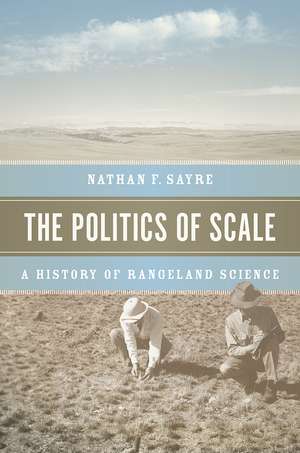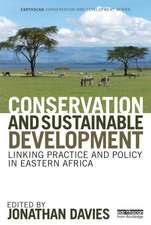The Politics of Scale: A History of Rangeland Science
Autor Nathan F. Sayreen Limba Engleză Paperback – 22 mar 2017
Rangelands are vast, making up one quarter of the United States and forty percent of the Earth’s ice-free land. And while contemporary science has revealed a great deal about the environmental impacts associated with intensive livestock production—from greenhouse gas emissions to land and water degradation—far less is known about the historic role science has played in rangeland management and politics. Steeped in US soil, this first history of rangeland science looks to the origins of rangeland ecology in the late nineteenth-century American West, exploring the larger political and economic forces that—together with scientific study—produced legacies focused on immediate economic success rather than long-term ecological well being.
During the late 1880s and early 1890s, a variety of forces—from the Homestead Act of 1862 to the extermination of bison, foreign investment, and lack of government regulation—promoted free-for-all access to and development of the western range, with disastrous environmental consequences. To address the crisis, government agencies turned to scientists, but as Nathan F. Sayre shows, range science grew in a politically fraught landscape. Neither the scientists nor the public agencies could escape the influences of bureaucrats and ranchers who demanded results, and the ideas that became scientific orthodoxy—from fire suppression and predator control to fencing and carrying capacities—contained flaws and blind spots that plague public debates about rangelands to this day. Looking at the global history of rangeland science through the Cold War and beyond, The Politics of Scale identifies the sources of past conflicts and mistakes and helps us to see a more promising path forward, one in which rangeland science is guided less by capital and the state and more by communities working in collaboration with scientists.
During the late 1880s and early 1890s, a variety of forces—from the Homestead Act of 1862 to the extermination of bison, foreign investment, and lack of government regulation—promoted free-for-all access to and development of the western range, with disastrous environmental consequences. To address the crisis, government agencies turned to scientists, but as Nathan F. Sayre shows, range science grew in a politically fraught landscape. Neither the scientists nor the public agencies could escape the influences of bureaucrats and ranchers who demanded results, and the ideas that became scientific orthodoxy—from fire suppression and predator control to fencing and carrying capacities—contained flaws and blind spots that plague public debates about rangelands to this day. Looking at the global history of rangeland science through the Cold War and beyond, The Politics of Scale identifies the sources of past conflicts and mistakes and helps us to see a more promising path forward, one in which rangeland science is guided less by capital and the state and more by communities working in collaboration with scientists.
Preț: 323.04 lei
Nou
Puncte Express: 485
Preț estimativ în valută:
61.81€ • 67.42$ • 52.12£
61.81€ • 67.42$ • 52.12£
Carte tipărită la comandă
Livrare economică 25 aprilie-09 mai
Preluare comenzi: 021 569.72.76
Specificații
ISBN-13: 9780226083254
ISBN-10: 022608325X
Pagini: 288
Ilustrații: 20 halftones, 10 line drawings, 2 tables
Dimensiuni: 152 x 229 x 23 mm
Greutate: 0.39 kg
Ediția:1
Editura: University of Chicago Press
Colecția University of Chicago Press
ISBN-10: 022608325X
Pagini: 288
Ilustrații: 20 halftones, 10 line drawings, 2 tables
Dimensiuni: 152 x 229 x 23 mm
Greutate: 0.39 kg
Ediția:1
Editura: University of Chicago Press
Colecția University of Chicago Press
Notă biografică
Nathan F. Sayre is professor and chair of geography at the University of California, Berkeley. He is the author, most recently, of Working Wilderness: The Malpai Borderlands Group and the Future of the Western Range. He lives in Berkeley, CA.
Cuprins
A Note on Units of Measurement
Preface
Introduction / Rangelands, Science, and the Politics of Scale
One / Producing the Range: Extermination and Fences
Two / Fire and Climax: Bureaucratic Divisions of Scientific Labor
Three / Squinting at Blind Spots: Southwestern Rangelands and the Consolidation of Successional Theory
Four / Fixing Stocking Rates: Monitoring and the Politics of Measurement
Five / To Manage or Manipulate: Natural versus Artificial Improvement of Depleted Rangelands
Six / The Western Range Goes Global: Neo-Malthusianism and Pastoral Development
Seven / Till the Cows Come Home: Overseas Failures and Critiques of Range Science
Conclusion / Capital, Climate, and Community-Based Conservation
Notes
Bibliography
Index
Preface
Introduction / Rangelands, Science, and the Politics of Scale
One / Producing the Range: Extermination and Fences
Two / Fire and Climax: Bureaucratic Divisions of Scientific Labor
Three / Squinting at Blind Spots: Southwestern Rangelands and the Consolidation of Successional Theory
Four / Fixing Stocking Rates: Monitoring and the Politics of Measurement
Five / To Manage or Manipulate: Natural versus Artificial Improvement of Depleted Rangelands
Six / The Western Range Goes Global: Neo-Malthusianism and Pastoral Development
Seven / Till the Cows Come Home: Overseas Failures and Critiques of Range Science
Conclusion / Capital, Climate, and Community-Based Conservation
Notes
Bibliography
Index
Recenzii
“Very readable and engaging, The Politics of Scale is an important contribution to a number of different literatures, including the political ecology of resource management and assessment, the history and sociology of resource management science (it is one of the very best treatments in this arena), and the history of this discipline and approach. Sayre does a wonderful job showing how this intellectual history matters. His serious engagement with the methods and practices of range scientists exposes a much richer and nuanced understanding of knowledge politics as influenced by the agendas of government agencies and key individuals and the needs of capital. I love this book.”
“The Politics of Scale provides a useful and interesting historical perspective on the development of range science as a merging of ecological understanding (some of it faulty), the economics of ranching and pastoralism, and land management policy. Rich in its historical coverage and distinctive in its focus on the evolving conceptions of range science and management, it effectively provides a genealogy of range science. I find myself reflecting frequently upon the ideas presented here. That, to me, is a mark of success.”






